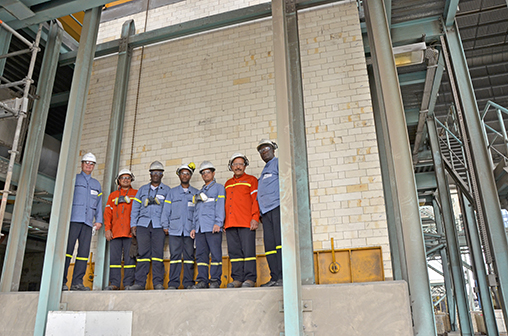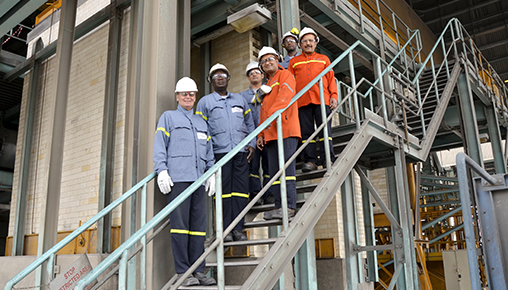
Qatalum reached a major milestone when it changed its 100th Fluewall from since start up in December 2009.
The objective of the operation was straightforward – maintain the superior functioning of the baking plant, in order maintain quality of the anodes produced.
The refractory condition of fluewalls play an important role in the production of high quality baked anodes. Aging of baking furnaces are measured by fire cycles, and at Qatalum, the furnaces are considered to be ‘aged’ when they have passed 131-fire cycles, around 7 years. With this measure in mind, strict inspections and plans to replace worn fluewalls are required to rebuild furnaces and maintain the quality of the products.
Out of the total 1044 fluewalls in the Anode Baking Plant, 100 Fluewalls were replaced. The first ten fluewalls were replaced by 2014, and the 100th fluewall was replaced on 14th March, with a safety record of zero injury – the beginning and the end of a journey that started in 2013.
The first step was taken when the first flue wall was constructed to check the workability of Fluewall Elevators or Construction Platforms.
As the first batch of fluewalls that were installed with the construction of the plant in 2009-2010 were getting bent, it was decided to straighten them. Straightening commenced in March 2012.
This was followed by a ‘Fluewall Manoeuvering Trial’ in June 2013, to assess the workability of other refractory equipment, and to confirm that the emergency response and preparedness of the concerned departments and staff were within the required parameters. One prefabricated fluewall from ABP-North end storage area was picked up and transferred with Furnace Tending Assembly (FTA) over the ‘Firing Equipment’ and ‘Anode Pull Bar’ to ensure safe clearance between top surface of firing equipment and anodes on Central anode conveyor and flue bottom.
By 2014, 10 fluewalls were replaced and in the meantime Qatalum developed a tool to compile overall condition of Anode Baking Plant refractories, based on discussed, defined and agreed criteria. All the fluewalls were thoroughly and periodically inspected in three stages.

In the first stage, tie bricks were inspected through peep holes. In the second stage, bowing, bulging and pinching of fluewalls were checked in the shorter refractory window. In the final stage of the inspection, using Pit Maintenance Unit, fluewall lateral surfaces were checked and ‘impulse tests’ were carried out, using hammer taps and by listening for specific sounds.
Detailed proactive Inspections are the most important step on the process, as only 50 fluewalls had to be replaced in 2016, as opposed to the initial plan of 190 fluewalls, saving Qatalum 5 MUSD for the furnace rebuilding.
Elaborating on the stringent standards that Qatalum maintains in order to ensure the quality of its products and the safety of its employees, Santosh Kumar, Manager, Carbon Technical Performance said, “As a dedicated team, we are proud in sharing the first milestone of fluewalls replacement with an excellent safely record. Based on the deteriorating condition of the fluewalls, our focus is to move forward in rebuilding the anode baking furnace, to ensure that we are in control and capable of improving and sustaining the quality of our anodes to achieve customer satisfaction.”
The Anode Baking Plant Manager pointed out that, “This achievement is a result of doing the basics well in every step of the Anode Baking Process and always seeking to improve our procedures and operating practices”.
This long-term operation reflects Qatalum’s uncompromising stance in maintaining the standards of its products and the safety of its employees, while reducing unnecessary costs, thereby contributing to the diversification of Qatar’s economy and Qatar National Vision 2030.
According to Bernhard Eich, Carbon Group Manager:, “The aging of baking kilns is depending on many different parameters. Congratulations and Thanks to the key performers and all our people. Two years later than expected, flue wall number 100 had to be replaced. Great technology, high safety, cost saving culture and quality orientation. Simply impressive!”

